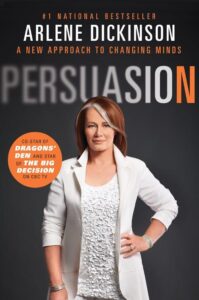
Question More, Action Knowledge.
Remember, at QMAK, we don’t just teach; we empower. We don’t just inform; we inspire. We don’t just question; we act. Become a Gold Member, and let’s unlock your child’s full potential, one question at a time.
 In her insightful book “Persuasion”, renowned entrepreneur and investor Arlene Dickinson introduces the concept of “principled persuasion” – a method of influencing others that’s grounded in honesty, transparency, and the desire to create mutually beneficial relationships. As homeschooling parents, understanding and applying these principles can be invaluable in nurturing the entrepreneurial spirit in your children.
In her insightful book “Persuasion”, renowned entrepreneur and investor Arlene Dickinson introduces the concept of “principled persuasion” – a method of influencing others that’s grounded in honesty, transparency, and the desire to create mutually beneficial relationships. As homeschooling parents, understanding and applying these principles can be invaluable in nurturing the entrepreneurial spirit in your children.
At its core, principled persuasion is about building trust through authenticity. Dickinson emphasizes that true persuasion is not about manipulation or trickery, but about being upfront about your intentions and avoiding deceptive tactics. This foundational lesson can be taught to children from a young age, encouraging them to communicate clearly and honestly in all their interactions.
One practical way to foster this skill is through role-playing exercises. Have your child practice pitching a product or idea to you, focusing on clear, honest communication. Provide constructive feedback on areas where they might be tempted to exaggerate or obscure the truth. By doing so, you’re not just teaching persuasion; you’re instilling values of integrity and transparency that will serve them well throughout their lives.
Another key aspect of principled persuasion that Dickinson highlights is the power of reciprocity. Effective persuasion, she argues, is about creating win-win situations where both parties benefit. This requires a shift from a self-centered perspective to one that considers the needs and desires of the person you’re trying to persuade.
To cultivate this mindset, encourage your children to think about what they can offer that would be genuinely valuable to the other party. For example, when your child expresses a desire for a new toy or a later bedtime, have them brainstorm ways they can make the request more appealing to you, such as offering to do extra chores or suggesting a compromise that meets both your needs. By learning to frame their persuasive efforts in terms of mutual benefit, they’ll be better equipped to build successful relationships in both personal and professional contexts.
Dickinson also stresses the importance of active listening and empathy in persuasion. To truly influence someone, you must first understand their perspective. This involves paying attention not just to their words, but also to their nonverbal cues and underlying emotions.
To practice this skill, try role-playing exercises where you and your child take turns sharing a story or opinion. The listener’s goal should be to fully understand what’s being expressed, summarizing what they heard and asking clarifying questions. By honing their active listening skills, your children will be better able to build rapport, anticipate objections, and tailor their persuasive messages to their audience.
At QMAK, our “Question More, Action Knowledge” philosophy aligns seamlessly with Dickinson’s principles of persuasion. We believe that true learning happens when curiosity is nurtured, questions are encouraged, and knowledge is applied in meaningful ways. By incorporating these persuasive lessons into your homeschooling journey, you’re fostering not just communication skills, but a mindset of active engagement and practical application that will benefit your children in all areas of life.
It’s important to remember that developing persuasive skills is a process, and mistakes are a natural part of that journey. Dickinson emphasizes the value of viewing setbacks as learning opportunities. When your child faces a persuasive challenge or rejection, guide them in analyzing what went wrong and brainstorming ways to improve. By reframing failure as a chance to grow, you’re fostering resilience and a growth mindset that will be invaluable in their entrepreneurial pursuits.
In conclusion, Arlene Dickinson’s “Persuasion” offers a wealth of insights for homeschooling families looking to nurture the next generation of principled, effective communicators and entrepreneurs. By teaching honesty, reciprocity, active listening, and resilience, you’re equipping your children with the tools they need to influencing ethically, to communicate authentically, and to create the win-win relationships that are the foundation of true success. As you incorporate these lessons into your homeschooling journey, you’re not just preparing your child for a career, but for a life of purposeful engagement and positive impact.

Remember, at QMAK, we don’t just teach; we empower. We don’t just inform; we inspire. We don’t just question; we act. Become a Gold Member, and let’s unlock your child’s full potential, one question at a time.